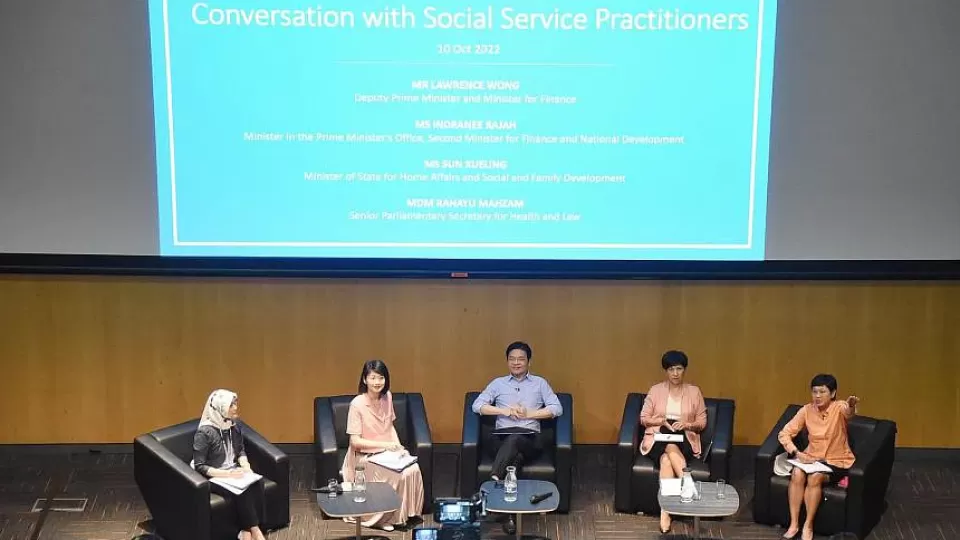October 11, 2022
SINGAPORE – Children from less advantaged backgrounds may face hurdles to success, such as low morale from not performing as well as their peers, said a social service practitioner.
“We always observe that people (from disadvantaged backgrounds) feel discouraged, they lack motivation. They want to get ahead. They want to fulfil their dreams, but sometimes they just find it too difficult,” he said.
He suggested promoting a culture of mentoring from those who have overcome the challenges of their less privileged backgrounds and found success at school or work.
Social service practitioners were voicing their concerns at the Forward Singapore dialogue at the Lifelong Learning Institute in Paya Lebar on Monday.
Forward Singapore is a nationwide engagement exercise that will culminate in a report in mid-2023.
The panellists were Deputy Prime Minister Lawrence Wong, Senior Parliamentary Secretary for Law Rahayu Mahzam, Minister of State for Social and Family Development Sun Xueling, Minister in the Prime Minister’s Office Indranee Rajah and Ms Ang Bee Lian, the Ministry of Social and Family Development’s director-general of social welfare.
The participants spoke under Chatham House rules, meaning their views can be reported, but they cannot be identified.
A panellist noted that the attendance rate at pre-school at the age of three is much lower for children from lower-income families than the national average.
“There is already some evidence that when the children attend pre-school early, they do not need as much intervention for learning support programmes in primary school, ” said the panellist, urging struggling parents to send their children to pre-school from the age of three.
The panellist also announced the lowering of the fee cap for government-funded pre-schools to support these families.
Ms Indranee said employers should step up their support of fathers, as the current utilisation rate of paternity leave stands at only about 50 per cent.
A survey has reported that one of the reasons fathers did not take paternity leave was the lack of support from the workplace, she added.
“But we’ve all seen what happened with the Great Resignation. You’ve heard of quiet quitting. You’ve heard of lying flat, all of these symptoms of people who are saying, ‘I’m tired, I can’t take it any more,'” she said.
“The employers need to take notice of this because I think having family friendly policies will become a competitive advantage in a tight labour market.”
Social service practitioners The Straits Times spoke to after the dialogue lauded the move to lower the fee cap for pre-schools and support working fathers.
They also stressed the importance of upstream support for lower-income families, as well as helping the parents find stable employment and manage stress.
Ms Rachel Tan, head of the marriage support department at Fei Yue Community Services, said that lower-income young couples she helps – which include transnational couples and some who are under 21 – are often busy dealing with bread-and-butter issues and have no capacity to look into early childhood education.
These parents often have trouble securing stable employment and even housing, and their young children’s education takes lower priority as they have to focus on feeding the children first, she added.
“We hope to help them relieve their financial stress and help them cope with their emotions and manage conflict in their marriage better, so they have more bandwidth to look into their kids’ education and development,” said Ms Tan.
Mr Mohamed Fareez, deputy director of the family and community support division at AMKFSC, said that while mentoring was a good idea, it should not limit the child to success in the area of academics alone, but also nurture the child’s other interests.
He added: “Can a mentor be also someone like a rock climber or mountaineer or adventurer, or someone who can open up spaces for children to also aspire in different ways other than the academic route?”


